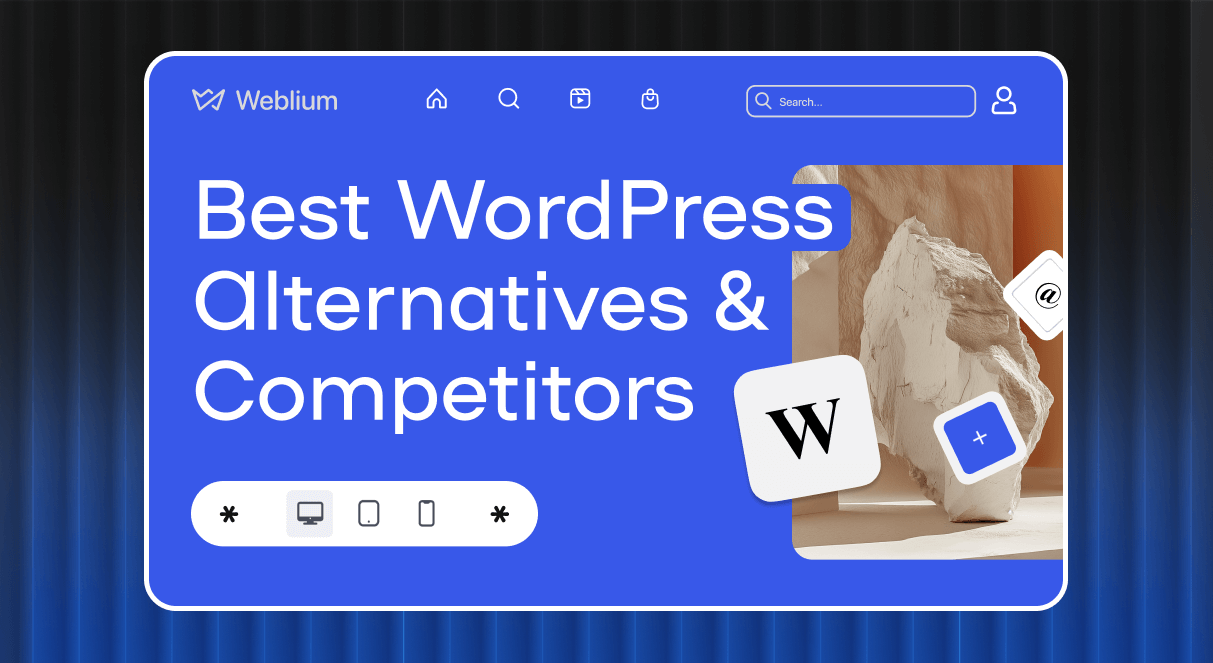
Best WordPress Alternatives & Competitors in 2025
Looking for the best WordPress alternative? Many website builders can claim this place, but each has its functionality, focus, and subscription plans. Choosing a platform for website creation is an important decision, and it is worth considering all aspects. This article presents 10 builders as competitors and alternatives to WordPress, their main features, and, most importantly, which niche it is better to choose one or another option for.
Contents
Why switch from WordPress?
Overall, switching from WordPress can be a wise decision for those looking for more flexibility, performance, ease of use, or customized features for their future site. But here are a few specific reasons:
- Little flexibility and many plugins. Some alternatives may have greater scope for customizing design or functionality without the need for many plugins.
- WordPress is difficult to use, especially for beginners. An alternative is a builder with a more straightforward interface or content management system.
- Overpriced: Some users may be looking for more economical or simpler pricing plans, especially if they are not using WordPress features 100%.
Free WordPress Alternatives In 2025
Whether you’re a small business owner, a freelancer, or someone just starting out, there are plenty of free alternatives that can help you create a professional and functional site with ease. Here are some top picks:
Weblium: Best for Beginners and Small Businesses
Pricing
- Free, $0 — basic plan.
- Pro, $8.25/month — for advanced users.
The free plan allows you to access 300+ templates, an SSL certificate, Google Cloud hosting, 24/7 support, and many other features. You can create a personal website and use it for free with Weblium branding.
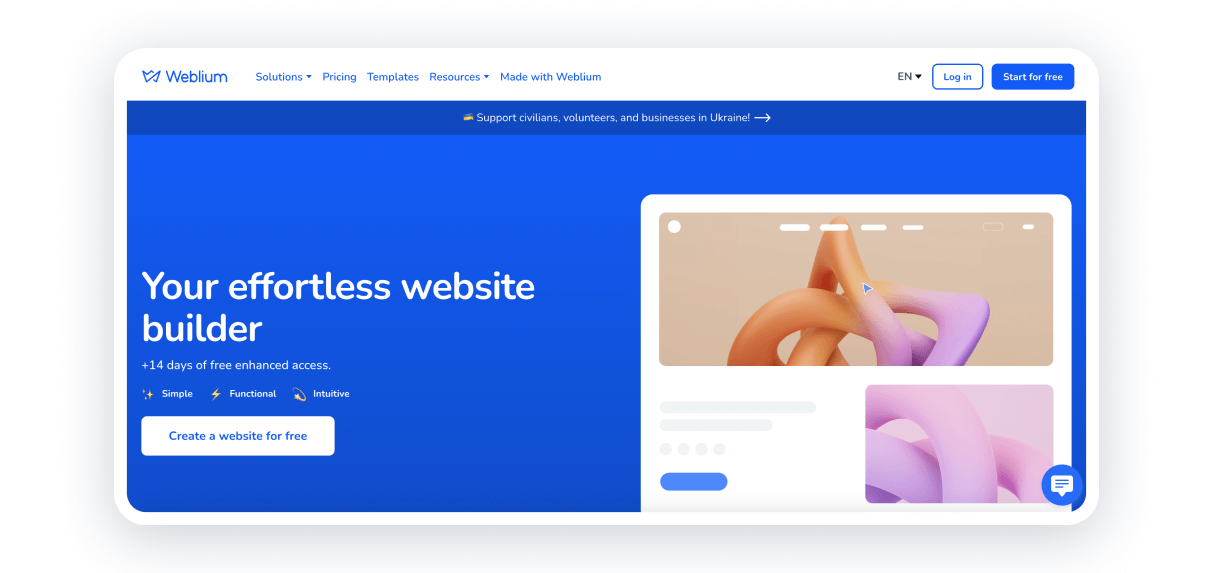
The Pro plan is suitable for blogs and full-fledged online stores. It offers SEO and marketing tools, custom code, and extended storage without Weblium branding.
You can add integrations to improve your website, such as a live chat that helps you communicate with your clients more effectively and a contact form to collect your clients’ personal information, such as names and phone numbers.
You can try the Pro plan for free for 14 days to see if it suits you.
Key Features
- All Weblium templates are high-quality and stylish, but the main thing is that they can be completely customized and made unique.
- Ultimate adaptability with Flex block — you can move elements without restrictions.
- Necessary tools for different sites — landings, online stores, business card sites.
- Affordable price and free plan.
- The support service will answer any question.
When to choose
As one of WordPress alternatives, Weblium is best suited for beginners. It offers a simple and intuitive editor that allows you to create a website in less than an hour. The knowledge base, guides, and videos will help you understand the functionality.
Weblium is perfect for a small business, with specialized templates, flexible SEO settings, and external services. If you have a limited budget, you should also try this builder. It offers advanced features at an affordable price.
Shopify: Best for Online Stores
Pricing
- Basic, $24/month — for solo entrepreneurs.
- Shopify, $69/month — for small teams.
- Advanced, $299/month — as your business scales.
- Plus, $2,300/month — for more complex businesses.

Shopify offers a full-featured online store with unlimited products and services, even in the cheapest plan. It includes standard analytics, customer segmentation, and E-commerce automation.
The following plans include more APIs, additional staff accounts, and fewer transaction fees. Only the Plus plan offers checkout extensibility, B2B, free expansion stores, bot protection, etc.
You can try Shopify free for 3 days, but not the Plus plan.
Key Features
- Drag-and-drop store creator with customizable templates.
- Apps give more features and functionality.
- Sales channels, marketing tools, and social integrations to sell online, in person, and worldwide.
- The POS system allows customers to shop their way, from online to the checkout line.
- Shop Pay — the one-click checkout.
When to choose
Shopify was created to sell, and it’s one of the most powerful WordPress alternatives for online stores. So, if you are interested in creating an e-commerce website and ready to expand, this builder will give you everything you need.
Squarespace: Best for Portfolios
Pricing
- Personal, $16/month — basic plan with access to fully customizable templates.
- Business, $23/month — for those looking to grow their audience and begin taking payments.
- Commerce Basic, $28/month — selling tools to help grow your business.
- Commerce Advanced, $52/month — all advanced tools.
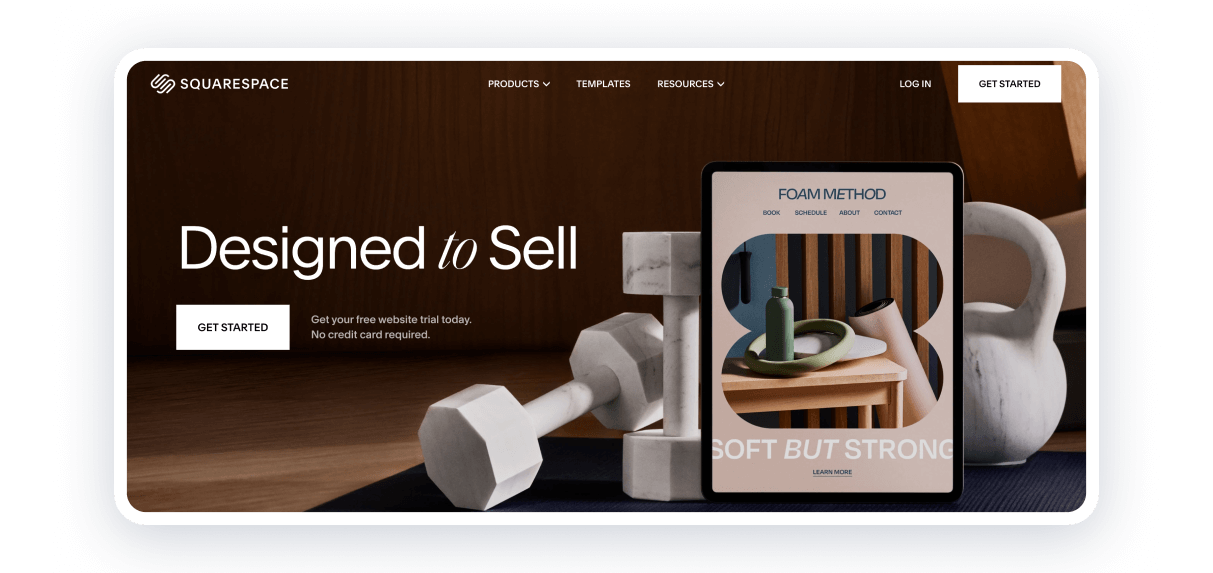
With the cheapest plan, you access beautiful templates designed to solve your business or personal goals. The Business plan includes advanced website analytics and professional invoices.
The Commerce Basic plan offers powerful merchandising and no transaction fees, while the Commerce Advanced one offers shipping, discounting, and subscription selling.
There is a 14-day trial in all 4 plans so that you can create your beautiful website.
Key Features
- Flexible designer templates, built-in mobile websites, and customization for every purpose.
- E-commerce business tools, from payments and checkout to shipping and fulfillment.
- Marketing and SEO tools.
- Courses and tutorials creation, uploading videos, and designing lessons.
- Squarespace App to manage a website on the go.
When to choose
Squarespace is the best builder for a portfolio website because of its stunning templates. It’s also a good choice for an online store or a personal blog, mainly if you focus on a visual impact.
So, if you’re searching for a platform like WordPress to make a beautiful website, Squarespace is a good option. There are also services you can consider as an alternative to Squarespace.
Wix: Best for Business
Pricing
- Light, $7/month — basic options.
- Core, $11/month — audience engagement.
- Business, $22/month — brand growth.
- Business Elite, $46/month — business scalability.
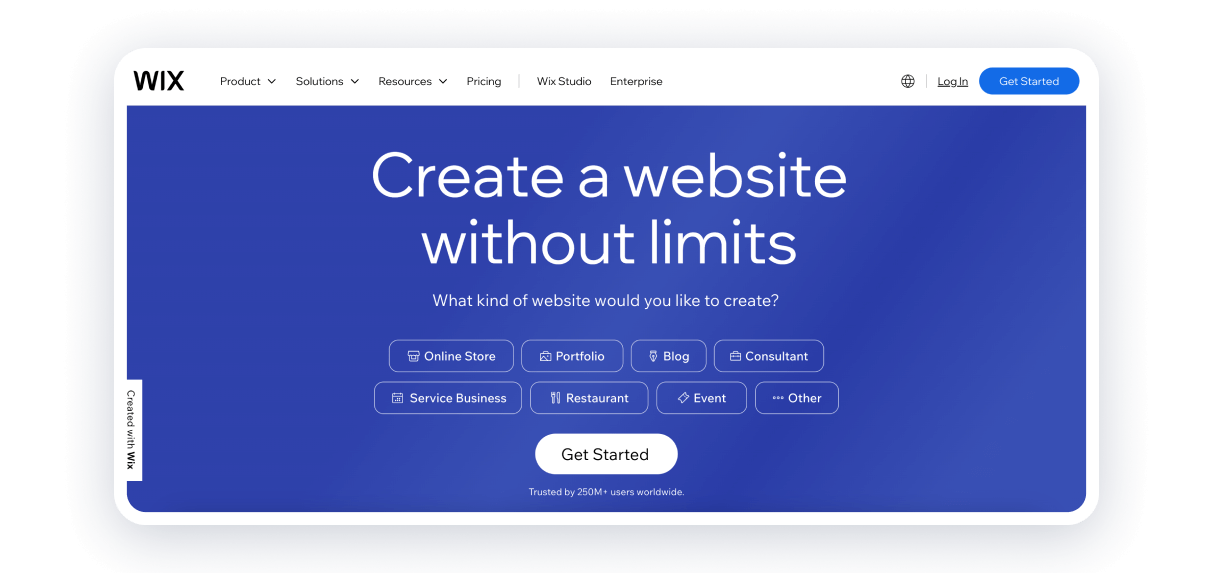
You can use Wix for free, and there is a 14-day money-back guarantee. The Light plan includes basic features like a custom domain and no Wix branding. The Core offers a full marketing suite and some payment tools. It’s good to choose the Business as a complete eCommerce platform. But if you need an advanced developer platform — the Business Elite plan suits you.
Be careful because the price can differ depending on your region.
Key Features
- 900+ free, customizable templates and a smart drag-and-drop editor.
- Marketing and E-commerce tools to boost your online presence.
- Complete SEO solution for business promotion and reaching the right audience.
- Full-stack web dev tools for custom functionality.
- Wix Owner app for capturing leads, getting reports and insights, business automatization, and more from desktop or on the go.
When to choose
Wix is a powerful business solution because you can sell anything and anywhere. The builder offers seamless store setup, selling, and inventory management, which makes it one of the best WordPress alternatives.
With Wix, you can enjoy benefits such as high-converting product pages, online shopping carts, and advanced marketing tools to grow your audience.
Webflow: Best for Designers
Pricing
- Start, $0 — for hobby and staging sites.
- Basic, $14/month — for relatively simple, static sites.
- CMS, $23/month — for blogs or other content-driven sites.
- Business, $39/month — for larger sites.
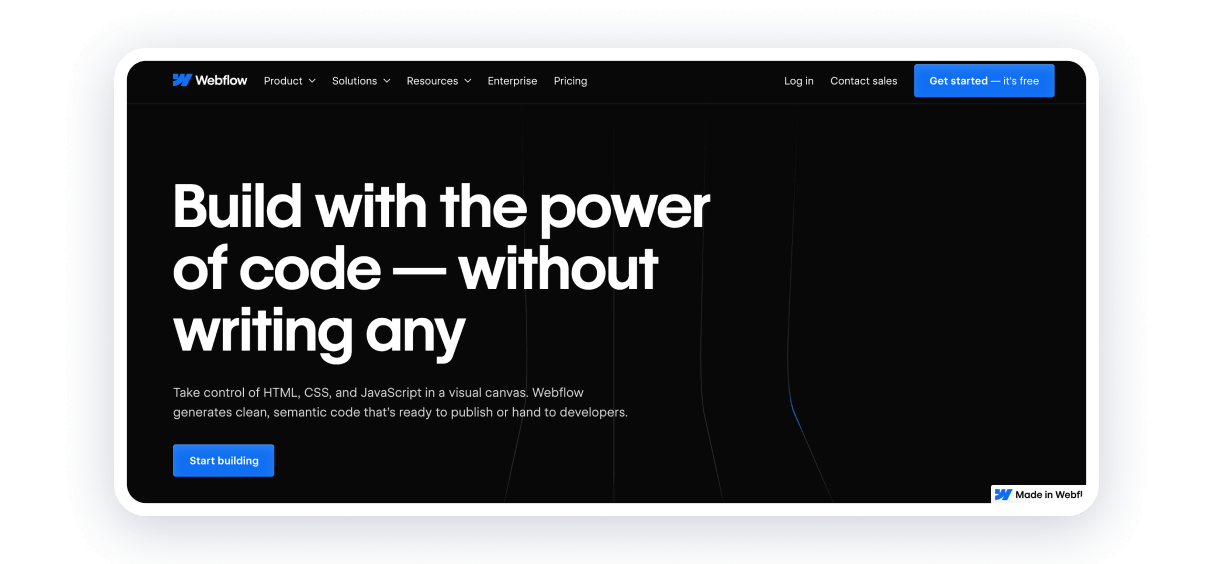
Webflow offers Site plans to easily build, publish, and host sites. The Start plan allows you to create an entry-level site for free and publish it to Webflow.io. With the other General plans mentioned above, you can use advanced tools for different kinds of websites.
In addition, three E-commerce plans offer features designed especially for online retailers, and the Enterprise plan is for those needing an enterprise-grade solution.
This builder also has a Workspace, a shared space where teammates and clients can work on sites together.
Key Features
- Fully customizable page structure, full control of styles, and content-rich pages with powerful CMS.
- Complex, rich animations; Spline, 3D, Lottie, and dot-Lottie files.
- Advanced collaboration — roles and permissions, page branching.
- Localization — fully localized experiences for site visitors around the world.
- Apps on the Webflow Designer.
When to choose
This builder offers many opportunities, especially for designers. You can build pixel-perfect, high-performance sites by filling a blank canvas, modifying common website structures quickly, and utilizing pre-built complex elements. Also, there is an option to build flexbox and grid layouts and then style every element to perfection.
Moreover, you can work within your existing design system and even export code for download. So, if you are a professional designer looking for WordPress alternatives, you will find many advanced opportunities here.
Medium: Best for Blogging
Pricing
- Free, $0 — publications will be available for anyone to read.
- Partner Program, $5/month — an opportunity to earn per story depending on engagement.
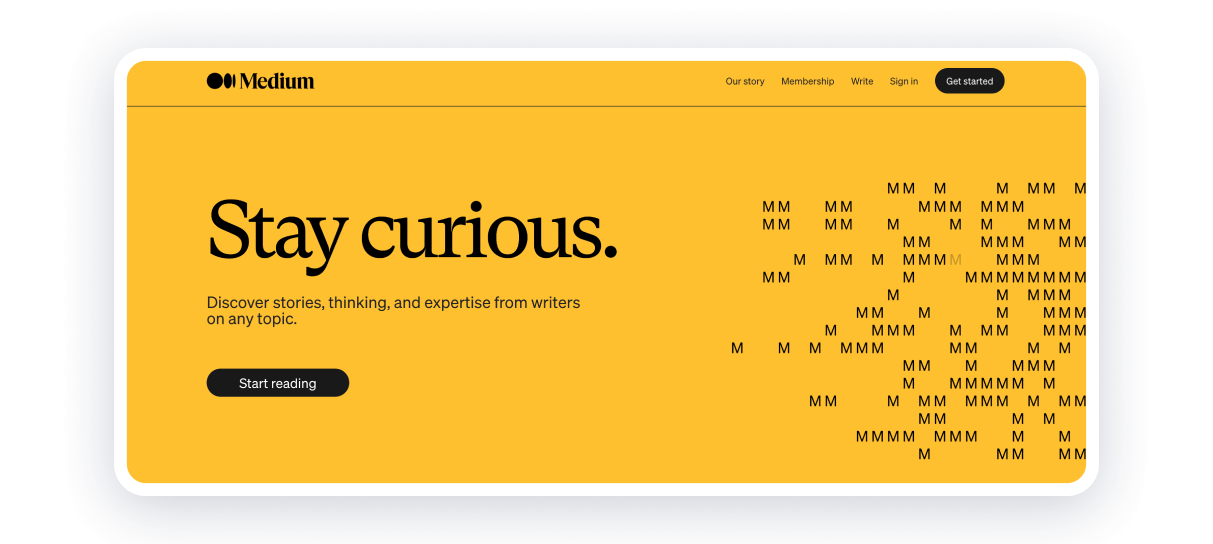
Medium is a publishing platform mainly built for writers. Its serious and concise focus is on blogging on different topics. You can write and publish articles that will be shown to everyone.
If you want to earn money, you can apply to join the Medium Partner Program. Once you are accepted, you need to set up payouts by linking your Medium account with a Stripe account and other third-party payment services.
Key Features
- Publications with basic formatting, images, third-party media embeds, and simple but powerful tools.
- Collaborations with other writers, custom domain.
- Positive interactions — earnings when members clap, highlight, reply, or engage with your story in other ways.
- Follower bonus and Boost bonus.
- Email subscribers to notify them about your publications.
When to choose
If you are looking for alternatives to WordPress to start your blog without effort and difficult tools, Medium can provide it. All you need is to sign up, write, and publish. Then, if necessary, try the membership opportunities and earn money from your publications.
It’s a community of people who want to support human stories and care about high-quality storytelling.
Duda: Best for agencies
Pricing
- Basic, $19/month — for a simple site.
- Team, $29/month — for expanded access.
- Agency, $52/month — for scalability.
- White Label, $149/month — for advanced tools.
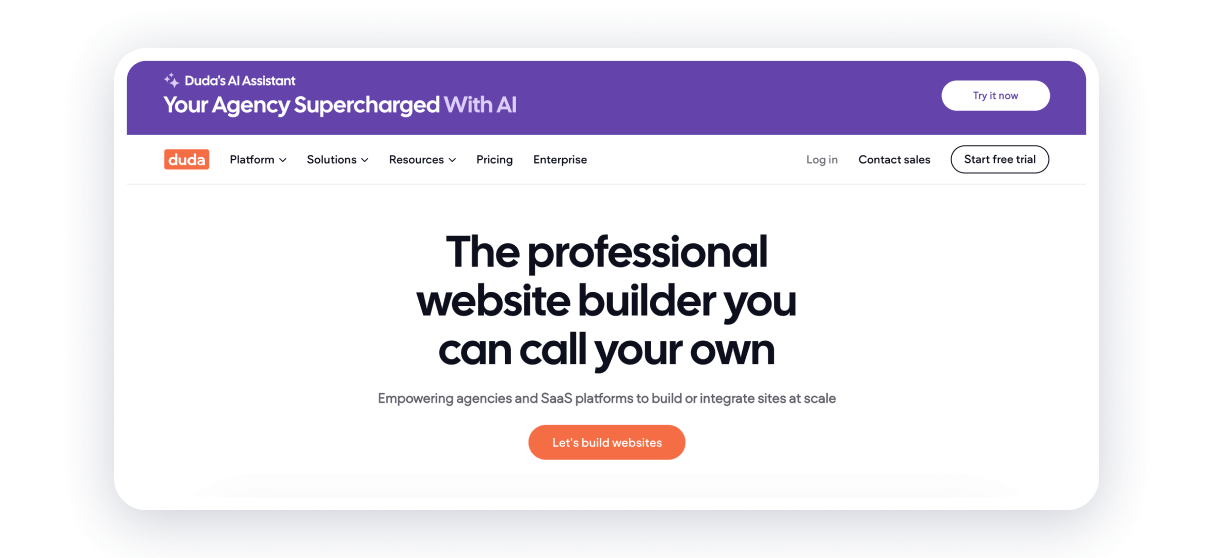
The cheapest plan includes the core — unlimited storage and bandwidth, up to 1000 multi-language websites, an App Store, etc. The next plans are good for team collaboration and client management.
Besides the above, there is a Custom plan to automate and grow with advanced tools such as integrations, APIs, and account management.
Duda also offers three E-commerce plans so that you can sell anything online and a 14-day trial.
Key Features
- The professional website builder for pixel-perfect sites with high performance.
- Efficiency maximization with a powerful no-code editor, global design settings, and AI tools.
- Powerful integrations and advanced API-driven workflows to create pages and entire sites automatically.
- Client management and collaboration tools that let you do it all from a single dashboard.
- Robust eCommerce and transactional site solution.
When to choose
Duda is a platform for growth suitable for agencies. It helps reduce production time and automate workflow. Its powerful dashboard helps manage all your customers’ websites. With Duda’s App Store integrations, you can use additional services such as SEO, accessibility, and CRM. In this case, Duda is one of the WordPress competitors.
Duda’s white label marketing materials help with upselling strategy, and you can quickly customize your client’s platform access according to the services provided in your upsell packages.
Site123: Best for business
Pricing
- Free, $0 — to start.
- Premium, $ 7.8/month — with advanced features.
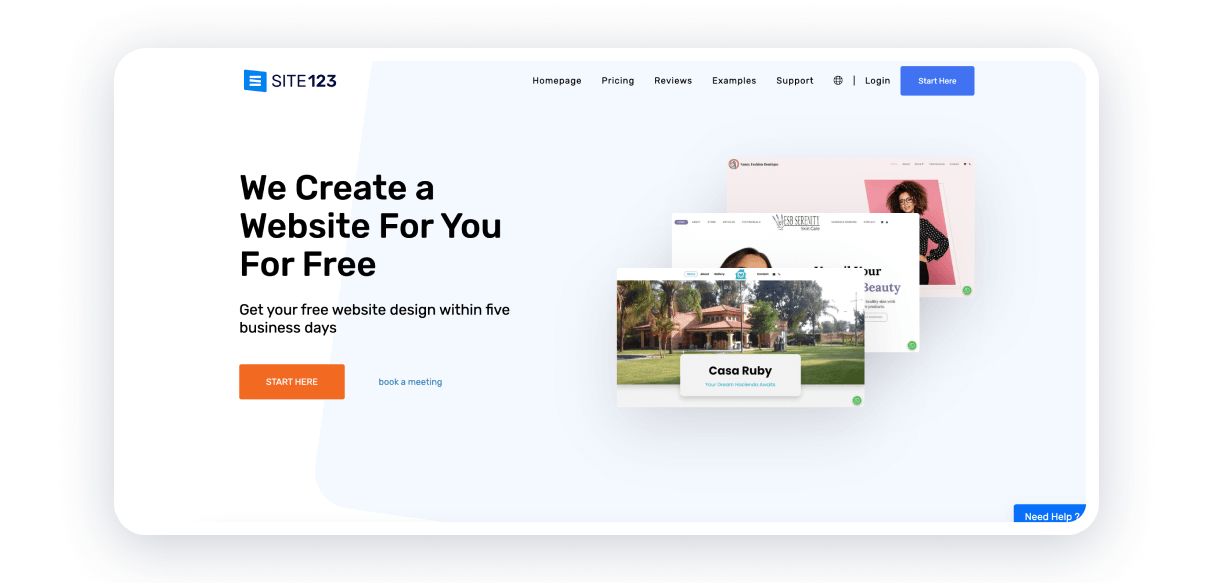
You can build a website for free. SITE123’s editor is more efficient than traditional drag-and-drop website builders. You can create a free website with its content management system and establish your online presence.
If you want advanced tools, there are four packages: Basic, Advanced, Professional, and Gold. Each package has specific features and is suited to different kinds of website users. SITE123 offers a 14-day money-back guarantee.
Key Features
- Intuitive and easy-to-use website builder; handling everything from website structures to design, you focus only on the content.
- Three easy steps to build a business website — select the website type, upload the content, and publish the site.
- Quick online store creation — upload products, configure settings, and start selling immediately.
- SEO tools to improve the results on search engines and drive traffic to business websites.
- Integrated image bank containing hundreds of quality pictures with no limitations.
When to choose
SITE123 allows everybody to create any kind of website quickly and easily and manage and update it once it has been published, at any time, and from anywhere in the world. So, it’s a good option if you’re not a professional designer and want to create a business website on a platform like WordPress.
All business websites are fully responsive, ensuring optimal viewing experiences across all devices. SITE123 offers an eCommerce tool that enables businesses to sell products quickly and customize any website.
Joomla: Best for communities and corporate sites
Pricing
- Personal, $99/year — for a single website with all extensions.
- Business, $199/year — for small businesses with multiple websites.
- Agency, $399/year — for developers and companies.
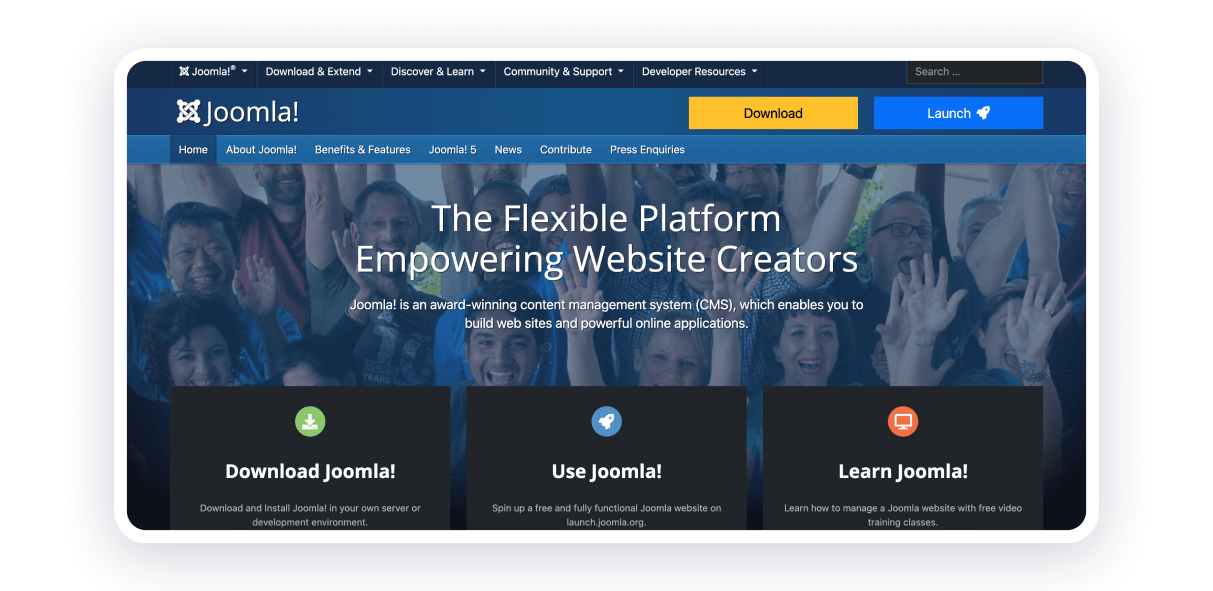
Joomla is a free and open-source content management system (CMS) for publishing web content. Its extensions, including booking systems, image galleries, LMS, and more, are free. Premium options are also available for your site’s needs.
The cheapest plan allows you to create one site and provides basic support. The Business plan offers five websites, Joomlatools Connect and Joomlatools Dashboard — additional tools and services — and premium support. The Agency subscription provides unlimited websites and VIP support.
Key Features
- A flexible system, easy to customize; thousands of verified third-party extensions and high-quality templates available, many of which are free.
- Powerful SEO tools, such as metadata and keywords, menu creation, etc., are built-in.
- Multilingual content management with over 70 translation packs.
- Extensibility to scale business and add new features.
- Free documentation and video training.
When to choose
With Joomla, you can build, organize, manage, and publish content for governments, non-profits, and large organizations worldwide. It is designed to be easy to install and set up, even for non-advanced users.
This platform can be considered a WordPress alternative because it suits communities and corporate sites due to its flexibility, extensions, user, menu, and cache management.
Drupal: Best for corporations and government agencies
Pricing
- Free, $0 — for creating websites.
- Membership, from $1,000/year — advanced tools for business.
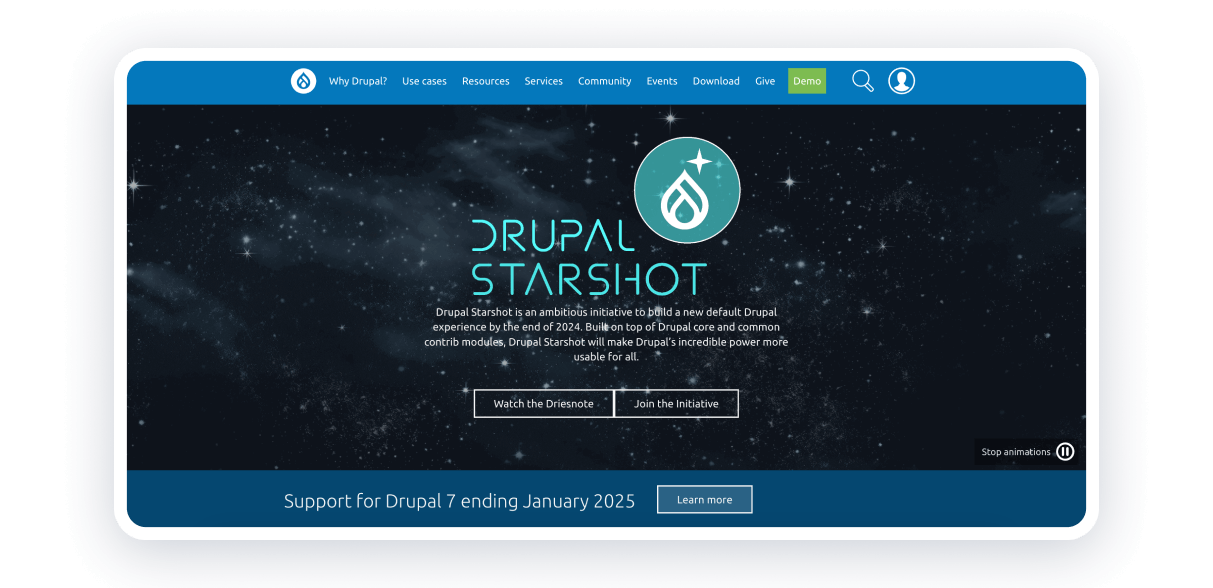
Drupal is a free and open-source content-management framework that can be customized and is suitable for developing simple websites or complex web applications. Drupal offers thousands of free modules and themes.
The Drupal Organization Membership Program provides numerous opportunities to expand your business. Organizations may save significant costs using a CMS with no licensing fees.
Key Features
- Both a content management system and a content management framework.
- 40,000+ modules are available to extend site functionality, and 2500+ themes are used to modify the site appearance.
- Accessible and multilingual; flexible by design.
- Tools include authentication, commenting, modules for wiki-like collaboration, site content structure, and hierarchical categorization.
- ‘Stack’ of software works in the background to serve sites and store content.
When to choose
Drupal is an open-source CMS suitable for government agencies. It enables their digital transformation and increases engagement. The organization can be centrally managed and controlled, while each agency and department has content independence, which makes it one of WordPress competitors.
Drupal ensures that your site will reach the audience, even people with disabilities. Assistive technologies include text-to-speech (TTS) tools like screen readers, speech-to-text (STT), hardware inputs such as keyboards and switch devices, and many browser extensions.
Conclusion: WordPress alternatives and WordPress competitors
Many builders and open-source CMS can be considered as WordPress alternatives or even competitors, offering features similar to this platform. Shopify is better for e-commerce sites and those looking for robust selling features and ease of management. Webflow is a designer’s choice wanting to create custom, visually stunning websites without extensive coding. If you’re looking for simplicity and functionality, Weblium is a good option, with an intuitive editor, integrations, and templates suitable for many websites.
FAQ
What is the best alternative to WordPress?
Choosing the best WordPress alternatives depends on your specific needs, such as ease of use, flexibility, e-commerce capabilities, and customization options. Wix has numerous templates and design options but less flexibility compared to self-hosted solutions. Shopify is best for e-commerce websites and has an extensive app store, but it can be expensive, with transaction fees unless using Shopify Payments. If you want an affordable solution with SEO, CRM, and stunning templates, you can try Weblium.
Which platform is better than WordPress?
Determining which platform is better than WordPress depends on your specific requirements and what you value most in a content management system (CMS). Squarespace is better for those needing a sleek, modern design with minimal setup and maintenance. Joomla suits users requiring more advanced site structures and custom content types.
Is WordPress still the best option?
Whether WordPress is the best option depends on your website’s specific needs and goals. Evaluate your specific needs while looking for alternatives to WordPress. Designers prefer Webflow for creating visually rich websites with a powerful visual editor. Medium is fantastic for writers and bloggers, has a built-in audience, and is easy to use.
What is more advanced than WordPress?
WordPress remains a top choice due to its flexibility, extensive plugin ecosystem, and strong community support. However, some might prefer alternatives to WordPress, such as Drupal, for advanced customization and security, or SITE123, for quick website creation.


